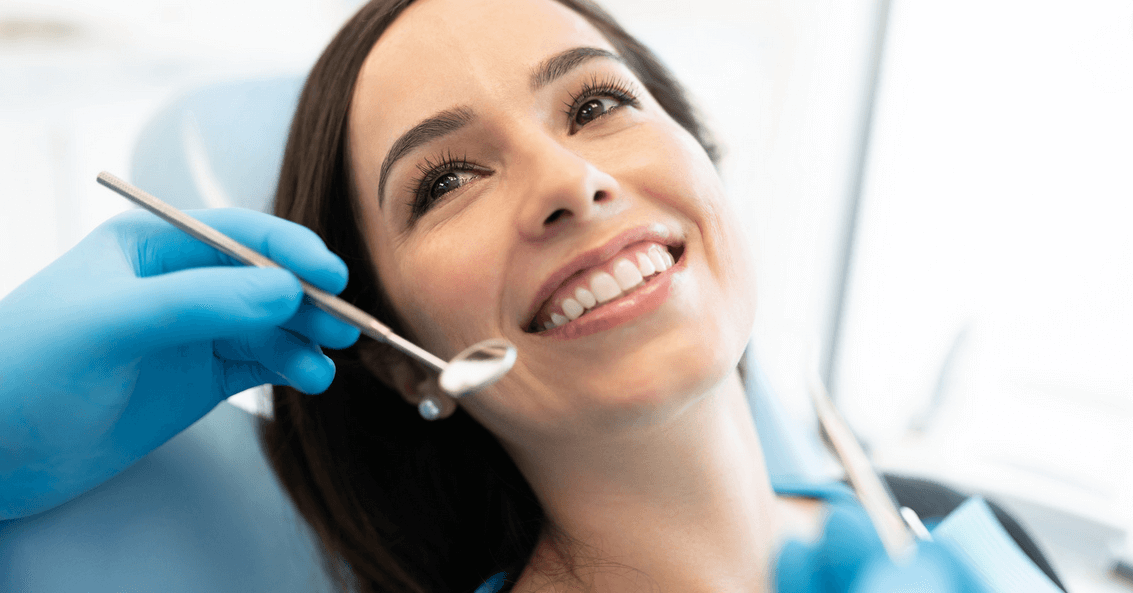
The Importance of Professional Dental Cleanings for Gum Health



Most people immediately think about a bright, flawless smile when it comes to optimal oral health. However, maintaining good gum health is just as vital. Our gums, or gingivae, are crucial in our dental structure, housing and securing our teeth. They also act as a defensive barrier that restricts harmful bacteria from damaging the roots of our teeth and the underlying bone structure. Unfortunately, gum health is often overlooked, leading to issues ranging from mild gum inflammation (gingivitis) to more serious conditions such as periodontal disease. This blog highlights the significance of regular professional dental cleanings and their indispensable role in maintaining healthy gums. By understanding their importance, you can take proactive steps towards better oral health and, ultimately, a healthier you.
Understanding the characteristics of healthy gums is the first step to maintaining good oral health.
Healthy gums typically exhibit a firm texture and a pinkish colour, although this can vary slightly depending on an individual's complexion. They fit snugly around each tooth, holding them securely in place. Healthy gums do not bleed or cause discomfort when brushing or flossing. Lastly, an absence of bad breath (halitosis) indicates that your gums are free from infection and disease.
The two most common gum problems are gingivitis and periodontitis. Gingivitis, the milder form, is characterized by red, swollen gums that bleed easily, especially during brushing or flossing. The damage can still be reversed at this stage, as the bone and connective tissue holding the teeth in place are yet to be affected. On the other hand, periodontitis is a more serious form of gum disease. Left untreated, it can deteriorate the bone supporting the teeth and may lead to tooth loss. Symptoms of periodontitis include receding gums, persistent bad breath, and loose teeth.
During a professional dental cleaning, a dental hygienist begins by examining your mouth, looking for any signs of gum disease or other issues. They then use a small, hooked instrument called a scaler to remove plaque and tartar from your teeth and gum line. This is followed by a high-powered electric brush and professional-grade toothpaste that cleans and polishes your teeth. The hygienist will then expertly floss your teeth, thoroughly cleaning areas often missed. Lastly, a rinse containing liquid fluoride is used to fortify the teeth until your next visit.
The removal of plaque and tartar is particularly crucial for gum health. Plaque, a sticky film of bacteria, and tartar, its hardened form, can accumulate along the gum line, leading to gum diseases if not removed. Therefore, This cleaning process helps prevent gingivitis and periodontitis by eliminating the harmful bacteria that cause these conditions. Moreover, fluoride strengthens your teeth and gums, protecting against bacteria and inflammation. It's thus clear that professional dental cleanings, by keeping your gum line free from plaque and tartar, play a pivotal role in maintaining overall gum health.
Regular professional dental cleanings prevent gum diseases like gingivitis and periodontitis. These cleanings effectively remove the accumulated plaque and tartar on your teeth and along your gum line - substances that, if left unchecked, can lead to inflammation and infection of the gums. The meticulous cleaning process goes beyond what daily brushing and flossing can achieve, reaching areas that are often missed in routine home care. This ensures that the harmful bacteria responsible for gum disease are thoroughly eliminated, keeping your gums healthy and disease-free.
Another significant benefit of regular professional dental cleanings is the early detection of gum problems. During these sessions, dental hygienists thoroughly examine your mouth, enabling them to spot early signs of gum disease that are not apparent or noticeable to the untrained eye. This early detection allows for prompt treatment, halting the progression of the disease before it can cause further damage. It's worth noting that the sooner a gum problem is identified and treated, the better the outcome, reinforcing the importance of regular dental cleanings.
Professional dental cleanings greatly improve your oral hygiene, complementing your daily oral care routine. While brushing and flossing at home helps maintain oral hygiene, they may not effectively remove all the plaque and tartar, particularly in hard-to-reach areas. This is where professional cleanings ensure these areas are addressed. Moreover, dental hygienists provide personalized oral hygiene advice during these sessions, like improving brushing or flossing techniques, contributing to your overall oral health. Therefore, professional dental cleanings are not just about maintaining healthy gums but also about safeguarding your overall oral health.
Neglecting professional dental cleanings can lead to the progression of gum disease from gingivitis to periodontitis. Without regular check-ups and cleanings, plaque and tartar accumulate on the teeth and along the gum line, allowing bacteria to flourish. In its early stage, gum disease may present as gingivitis, characterized by red, swollen, and bleeding gums. However, without proper treatment, gingivitis can progress to periodontitis, a more severe form of gum disease that can damage the soft tissue and destroy the bone supporting the teeth, leading to tooth loss in extreme cases.
The consequences of advanced gum disease extend beyond oral health. Periodontitis not only results in tooth loss but also increases the risk of other serious health problems, including heart disease, diabetes, and respiratory diseases. Studies show that the bacteria associated with periodontitis can enter the bloodstream, contributing to inflammation and damage in other body parts. Therefore, neglecting professional dental cleanings and allowing gum disease to progress can significantly affect oral and overall health.
The frequency of professional dental cleanings can differ based on an individual's oral health condition, but general guidelines suggest a semiannual schedule — that is, you should get your teeth professionally cleaned at least twice a year. This frequency effectively manages plaque and tartar, keeping gum disease at bay and maintaining oral health.
However, it's important to note that individual needs may vary. For those with a history of gum disease or those at a higher risk due to conditions like diabetes or dry mouth, more frequent cleanings may be recommended. Similarly, smokers, pregnant women, and people with weakened immune systems might also need more frequent dental cleanings. Always consult your dentist to establish a cleaning schedule that best suits your oral health requirements. By tailoring the frequency of cleanings to individual needs, dental professionals can provide the most effective care and prevention strategies for each patient.

Maintaining healthy gums is a continuous process beyond your biannual dental cleanings. Here are some guidelines to help you preserve your gum health between these professional visits:
Plaque can be effectively removed at home through thorough brushing and flossing. However, plaque may progress into calculus (tartar), making the plaque harden and become as tough as tooth structure. In such cases, regular brushing and flossing alone are insufficient to eliminate it. Mechanical debridement by an oral health care professional is necessary. Despite practicing excellent oral hygiene, some calculus buildup is inevitable due to difficult-to-reach areas and the limitations of dental hygiene tools used at home.
Remember, these practices can significantly improve gum health but cannot replace professional dental cleanings. So, maintain your regular dental cleaning appointments to enjoy a healthy smile.
Many people harbour fears related to dental cleanings, including the fear of pain or sensitivity. However, it's essential to understand that dental cleanings are generally painless. If a patient does experience discomfort, the hygienist can apply a topical anesthetic to numb the area. Furthermore, for those concerned about sensitivity, modern dental technology and professional-grade products help minimize any temporary sensitivity caused by the cleaning process. Clear communication with your dental professional is crucial, as they can adjust their techniques to make the cleaning more comfortable for you.
One common misconception about dental cleanings is that they are unnecessary if one maintains good oral hygiene at home. While regular brushing and flossing are vital for oral health, they cannot completely remove all plaque and tartar. It's important to remember that professional dental cleanings offer a more thorough clean that your at-home routine can only achieve in hard-to-reach areas. Moreover, these cleanings allow your dentist to examine your oral health closely, detect potential issues early, and provide appropriate treatment. Hence, professional dental cleanings are a fundamental aspect of preventive dental care and overall oral health.
Dental professionals firmly emphasize the importance of regular cleanings. They view professional dental cleanings as a vital defence against serious oral health issues and more than just cosmetic procedures. These sessions offer a unique opportunity to thoroughly remove plaque and tartar build-up, which a regular toothbrush cannot achieve.
A dentist's trained eye can also identify early signs of dental diseases, such as gum disease and oral cancer, as well as other health concerns that may have oral symptoms, like diabetes or heart disease, thus ensuring timely intervention. Regular cleanings also allow dental professionals to provide tailored advice on individual oral hygiene practices and diet, further bolstering the preventive aspect of dental care.
From a dentist's perspective, the significance of consistent professional dental cleanings lies in achieving a brighter smile and, more importantly, maintaining overall oral health, averting potential dental issues, and contributing to general well-being.
Professional dental cleanings are paramount in maintaining optimal gum health and oral hygiene. They facilitate the effective management of plaque and tartar, preventing the onset and progression of gum disease. Furthermore, these cleanings allow for early detection and treatment of oral issues, ensuring your smile remains healthy and beautiful. While essential, your everyday brushing and flossing cannot replace the thoroughness of professional cleaning. Thus, scheduling regular professional dental cleanings is indispensable regardless of how diligent your at-home oral hygiene practices are. Remember, your oral health is a vital component of your overall well-being.
At Newbury Dental in South Edmonton, we are dedicated to assisting you with your oral health needs. We invite you to visit our contact page if you require more information or want to schedule an appointment.

We look forward to meeting you! Call 780-760-3033, email info@newburydental.ca, or request an appointment online to set up your first visit. We’ll be in touch soon!